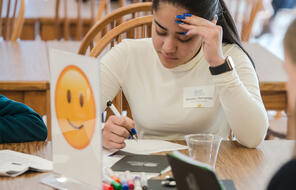Breadcrumb
Milgram - Doc Miller
At a Glance
Language
English — USSubject
- Social Studies
- Culture & Identity
Milgram - Doc Miller

Hello. My name is Doc Miller, and I work here at Facing History and Ourselves. In the video that you're going to be seeing, I think it's important that you know first that this class has been together for a while and we've really worked together to create a reflective classroom community, and that's what it is. In doing this, a key word for us is respect, a sense of deep respect for each other as human beings and as thoughtful learners together. In John Dewey's words, we really are a community of learners. And so what you'll see in this video is really a sense of trust that we have in each other, trust to talk about what's important in life, in history and in the world.
Also, I think, besides a deep trust in each other, there's a deep respect for each other and for the subject matter that what we're talking about, that we're lucky enough to come together and talk about subjects that really matter to us and to the world today. And so that's a privilege. And I think you'll get a sense that we all feel we're lucky to be a part of this community of learners. Also, I'd like to point out that the skill that we try to focus on throughout the year-- and the students are really aware of this and it's integrated into our classes throughout the year-- is put simply in two words, to "look deeply."
You'll hear that phrase used because what we're trying to do is get underneath the history and ask why, to look at human beings and examine their behavior, and to look at our own selves and our own society and our world today. So looking deeply in this community of respect and trust is key to viewing this and knowing that that's what we're really about as a classroom. In the video that you're going to be seeing, the class is focusing on the Milgram experiment. And I think it helps to know a little bit about it.
Stanley Milgram was a psychologist at Yale University in the early 1960s. And he did an experiment to focus on the concept of obedience. But some of the key people in it didn't realize that. In the video that the students saw before this discussion takes place, they have seen the experiment happen. And in the experiment, there were three key people, Mr. Williams who is in a lab coat, a Yale University professor and he runs the experiment.
There are two other people, one of them is taken from the general population and doesn't really know exactly what's going on. Mr Williams tells him that it's an experiment about teaching and learning and memory. The person from the general population is the teacher. The other person is the learner. The teacher is to ask questions of the learner, and if the learner does not get it right, he is to hit a button that will send volts into the learner. In fact, the learner is not really receiving those volts, but the teacher thinks that he is.
And so what's really being tested is nothing about teaching and learning and memory, but rather focuses on how obedient will the teacher be to Mr Williams who keeps telling him that the experiment requires that you do this, that if the learner gets the answers wrong, then you have to send the volts to him and cause that pain. How obedient will the teacher be? And so that's what the discussion focuses on.
So it's the Milgram obedience experiment. And just to review to get the facts straight so we're all on the same page, I wanted to know your thoughts about this and what we can learn, so I want to have a discussion around it. The four questions that I gave for homework are the four-- basically, was the structure of the whole discussion today, why do some people stop and not go? Why do some people go all the way? What does this experiment tell us about human beings and about human behavior? And how does this connect with the history that we're studying in Nazi Germany?
So the question is, why-- how come? What's up with that? Why do some people stop? What do you think? And we'll just keep trying to dig together. Let's begin. Angela.
They think they're hurting someone and, I mean, it feels kind of wrong to be torturing people. And they want to stop so they might want to stop because of that reason. And plus the guy tells them to stop, so, I mean--
The guy tells them to stop?
Well, like, the-- not the--
Use these three--
The learner tells the guy to stop because he's getting hurt from the electric shocks.
Yeah, but the fact is, most people didn't stop. So therefore, that didn't work in most cases, Ange.
Well, it shows kind of how much like peer pressure affects people--
Peer pressure?
--because if the professor wasn't going to go all like, we have to do the experiment and stuff like that, they'd probably stop a lot sooner.
Well, so you say peer pressure, but I'm thinking of Heather Benzer's very good question the other day. She said, wait a minute though, we say that he obeyed Mr. Williams, that the teacher obeyed Mr. Williams. The learner, the ones who went to 450, isn't there peer pressure? There's peer pressure. There's two people. He's getting pressured to go on by this guy, not to go on.
Well, I mean, Mr. Williams--
Why does he obey-- why do the ones--
Because the ones who do go further, because Mr. Williams is like-- seems to have more knowledge on it. He seems to be like-- so you can listen to him because he's a professor. I don't know.
OK, so let's go back. Let's go. That gets us more into the second question. Let's get back to the first question, why do some people stop then? Because you say they listen to the peer. Well, I see what you're saying, but there were two.
It's just a matter of opinion if you take it one way or the other, I guess. So--
So it's just, oh, I don't care. I'll go this guy. I'll go this guy.
No, I don't know.
It's hard. I'm making it hard for you because it is tricky. I'm complicating your thinking, I know, Ange. And that's not bad, it's just, you've got to be clear. Why, in your opinion, do some people stop? Because he's got one saying to go and one saying stop, doesn't he or don't they? I can come back to you, Angie. I can come-- if you want, or you can finish. You want to say more?
Well, because they're hurting the guy. I mean, they've felt pain. They felt the shock themselves, they know it hurts.
OK. All right, all right, I understand that, and that's fine. No, I think that's fine Ange, but then I take it a step level, a step deeper. Everybody heard that and most didn't stop. So then that's fine what you said, but let's keep digging. This is not easy. I told you. You remember when I gave these questions? I said, these are questions that you can't just answer here. You've got to keep digging and then digging and then digging, talk about look deeply. There's a lot of layers because the fact is everybody heard that they were hurting the guy, and most didn't stop.
It did get complicated for kids and kids got frustrated. And I said to Ange, I know I'm complicating your thinking, but I think that, sometimes, has to happen. And I know she's strong enough to deal with it and stay with it. And I have such a good relationship with them and they know that I care about them as thoughtful people and that it's safe and they're not going to get creamed. And I think when you're genuine and you respect them, they respond.
Let's keep digging together as a group. And by the way, you can talk to each other refer to what-- don't just-- you don't just have to talk to me. Yeah.
I think that some people stopped because they have conditional obedience, which means they'll go as far as strapping the guy, the learner into the electric shock things and they'll listen to Mr. Williams give them directions. But once they hear that they're hurting the person, they'll stop because there's conditions at which they'll do something, but once they think something's wrong, they'll stop.
Uh-huh, and like the guy who went all the way had unconditional obedience then, you would say? So then what I would ask you then, why do some people have conditional obedience and some people don't?
Well, I think people have conditional and unconditional obedience because maybe all their lives have been forced to obey everything their parents told them and they're in a very strict thing. And so then they've always been like afraid of a higher authority, so then they'll have unconditional obedience for anybody that seems like they have more authority over them.
So the ones who go all the way have unconditional obedience because that's the way they've been trained?
That's just like the way, how they've lived all their lives. I think a lot of people, like, maybe their parents forced them to do everything and would punish them if they didn't obey them. So then maybe they're just afraid of the higher authority.
So what I'm hearing from you guys is it's your background and it's how you were brought up. And some were brought up to be more obedient and some were brought up to be more conditional obedience. Let's keep digging together. Let's keep digging together. You know what this unit does is, it does what I'm asking kids to do, it slows down. I want them to slow down. That's why when I see MCAS and they say cover 700 years of history in two weeks, you can't look deeply.
And what this does is, we really can stop and examine different voices at one period of time and a variety of them and different reasons why people do things. And if you want to get learning that sticks with kids-- and it does stick because I've been doing this for 22 years, and they come back and they tell me this is the most powerful unit they've ever had. I can't tell you the times I've heard that from kids and parents-- you need to slow down, and that's what we do. I love going slowly through this history.
Milgram - Doc Miller
How to Cite This Video
Facing History & Ourselves, “Milgram - Doc Miller,” video, last updated February 11, 2014.
You might also be interested in…
Mood Meter

Three Good Things

Slow Down with The Slowdown

Take a Stand

Appreciation, Apology, Aha

Closing Challenge

Looking Back, Looking Ahead

Our Names and Our Place in the World

Making Meaning of Community

Emoji Emotions

Picture This



